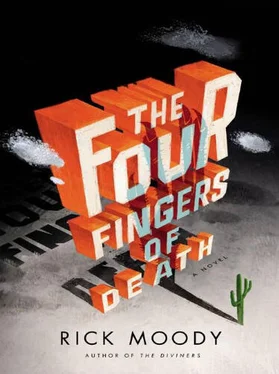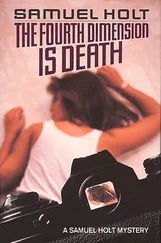And it is likely, kids, that this was an accurate description of my finger, which in the months since it had been separated from me had mostly been cleaned of the blood and gluey material that it secreted at first. It was now mainly a talisman. And that must have been the reason Brandon kept it, to remind himself that there was something that divided him from me, from the rest of us. He believed, at this late hour — while holding aloft in one hand his straight razor and in the other my finger — in duty , nothing more, and was willing to die a nasty, unrepentant death in order to indicate how devoted he was to his concept of duty. Jim Rose was happy to oblige.
Jim fell upon the other man without mercy, and as he went to grab Brandon’s razor with a hand, a hand mostly without feeling from the night spent outdoors, the possibility of injury was not of particular concern. When he was cut, the blood poured forth from his hand as elsewhere. He could see the effect of himself on the other man. Still, he could see how he inspired fear, and it made him only more murderous, and having flung the offending blade free, he went as to pick up the other man, who had no more fight in him, nor even the strength to pull at Jim’s outer layer or his hemorrhaging flesh. There was a paradoxical tenderness in the moment, as if deep within Jim was a sense that it would be possible, at last, to do this thing without violence, without some display of machismo. He could do it without, for example, eating Brandon’s heart, or making a stew out of him, or stealing back my finger from Brandon, because these were unnecessary, because all Brandon had to do was to give in to this place of death. Brandon had to become one with the tendency of death to pool in the valleys of Mars, likewise upon its mountaintops. Brandon submitted to being carried to the edge of the Valles Marineris, to one of its most imposing rises, because Brandon was, at this point, so close to being congruent with the reality of Martian death as to be nearly indistinguishable from it. And then Brandon submitted, summarily, without warning, as Jim heaved his body from the top of the cliff, nearly four miles up. There was a little bit of stumbling at the last moment. Jim didn’t want to fall into the ravine himself. But he also wanted to watch. It was reflexive. The thrill of gravity at a moment like that.
Brandon didn’t twist, gyrate, cry out, or anything of this sort. His was a smooth death. He fell with a remarkable lack of resistance. He could have been a sack of grapefruit or a pile of wet towels. He fell, and then he was dead. He carried a little piece of me with him.
Jim turned from the edge of the cliffside, as soon as he assured himself that his thirst for this moment was now slaked, and then he began his long walk.
What simple, uncomplicated perceptions were his during the march that followed? Were even the simplest grammars still relevant to his primitive consciousness? We can assume that sunlight, glorious and perfect, which, despite its cosmic radiation, was still a lovely thing on Mars, was part of his sensory perceptions. Jim was happy at the appearance of sunlight, each and every day, after the nights he spent out in the elements, trying to stay warm in his Martian jumpsuit, which was leaking oxygen and which properly ought to have killed him days before. This fact — that he ought to have been dead — was probably lost on Jim. The sunlight warmed him, and the sunlight was good. Trudging along the Ius Chasma for days, without food or water, even this was somehow satisfying, because he became, in a way, part of the Ius Chasma. In different kinds of light, the canyon was perceptibly different, and there were layers of bedrock that he hadn’t seen the day before. He didn’t recognize this, but he recognized that the canyon belonged to him somehow; he had assumed ownership. The danger of it was like his own menace, and this was reassuring. Eventually, he repaired the ultralight to a barely workable condition and traversed the outflow portion of the Valles Marineris until he crash-landed it somewhere outside of base camp. Which is to say that he walked in. A representative of the walking dead. There were only these simple commands coming from the back brain, keep going, don’t stop, keep going . It’s fair to say now, kids, that there was some kind of homing beacon in him, and I employ the word home with the full sense of its meaning.
I was in the power station when he finally turned up, dragging himself, dragging a leg that looked as though it would not stay attached to him for another five steps, and bleeding, garishly, in many spots, bleeding chiefly from the eye sockets. It was the most shocking illness I’d seen in my life, and I have seen some horrible things. I have seen what weaponry can do; I have watched men drown in their own wounds. I don’t know how to describe what I saw. I am still trying to figure out what I saw. It was as if Jim had emerged from the Dark Ages, from some savage and merciless eon, and when he thundered on the door, and I attempted to admit him, I was not really sure that I ought to have done so. Because I had given myself over to thinking that it was all about the germ , that the Mars mission was now all about the germ, no matter what they told us. And I didn’t know if the germ was communicable, and I didn’t want the germ. But once I saw him, and I saw the confusion on his face, a confusion that plainly wondered what had happened, what had become of him (when his intentions had once been so noble), I had no choice but to admit him.
He didn’t need to say anything. I knew enough to know what he felt. And I filled a bucket with water that was warm from the reactor, and I found a rag, and I began to try to bathe his wounds, the many, many wounds on the sallow, fetid body of Captain Jim Rose. He lay there, soundlessly, on the floor. Whenever a wound was rinsed, a fresh gurgle of corpuscular material seemed to bubble forth from it. I felt his forehead, kids, and his forehead was cold, horribly cold.
“What do you want me to do?” I asked him. “Is there something I can do for you? Do you want me to talk to NASA and tell them what’s happened?”
Jim said nothing.
“Do you even know what’s happened? Because I’m not sure I know what’s happened.” And I didn’t know. I had my surmises. But I had not yet assembled the dossier of reports and video footage and satellite images that would enable me to re-create the end of the Mars mission for you kids. I was still mulling over the crisscrossing of disinformation that was being fed to us by a government agency that was so wound up in the budgetary conflicts and the rapacious needs of independent contractors that it couldn’t give a straight story to any taxpayer, no matter how earnest his entreaties.
Jim managed, with some great effort, to struggle to his feet, and he wandered back and forth in the control room of the power station, as though he were looking for something specific, even though I couldn’t imagine what it was. He would linger in front of some computer screen, gazing upon it as though he had never seen a computer screen before, and then he would press a bloody palm down on some surface, look at the handprint, and then in his disturbed way, he would begin wandering again. As if he couldn’t stop. He seemed stunned by an array of tools that was stored on one wall. He looked at a whisk broom for a while. There was a gas mask, and for a second it seemed that he was going to try to fit the gas mask onto his face, to replace that cracked helmet and visor he’d left out on the front step.
Then he found the Taser.
Somehow Jim still knew very well what the Taser was for. Not only did he know what the Taser was for, but he knew how to set it on the setting that would inflict the maximum amount of damage. It occurred to me, kids, and I am not proud of saying it, that he was going to use the Taser on me . My survival skills had become uppermost. I was working hard at staying out of trouble, but now trouble had come to my door.
Читать дальше












